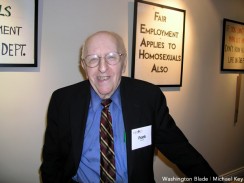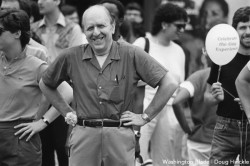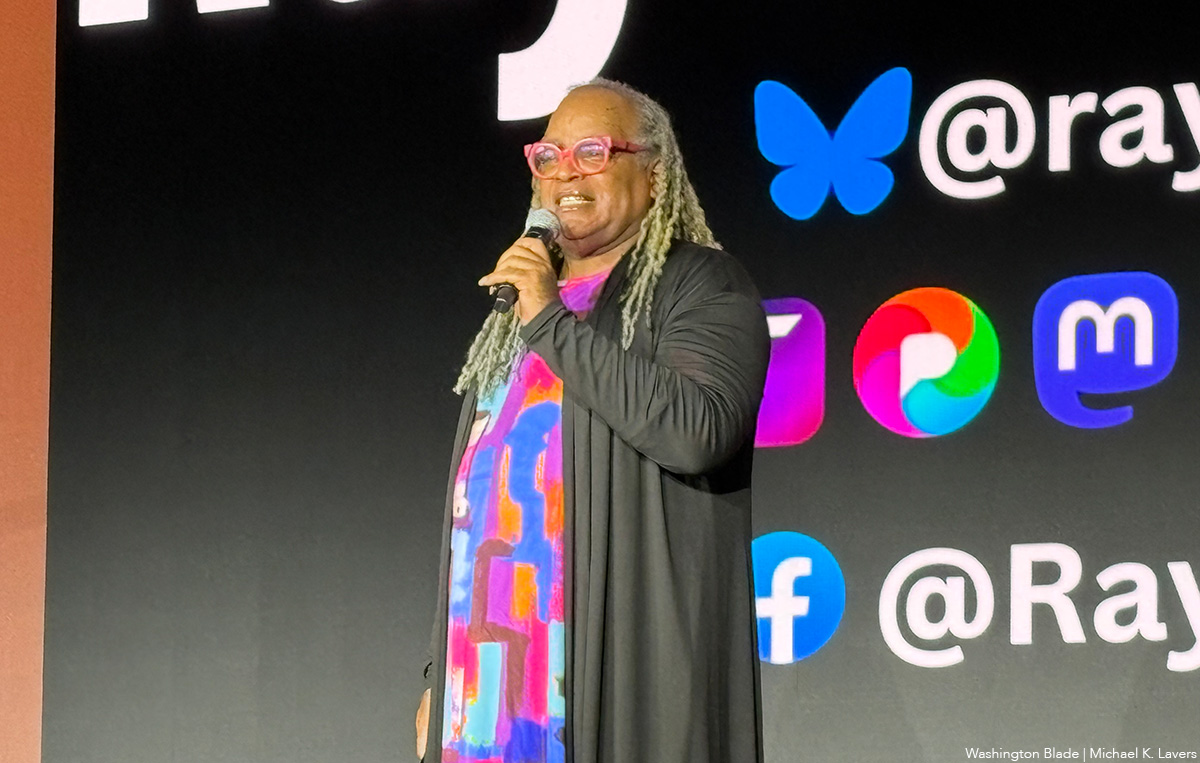Local
Covering Frank Kameny
A reporter’s 35-year journey chronicling the nation’s preeminent gay activist


Frank Kameny served as a colorful, reliable source for the Blade and other news outlets during his decades of activism. (Washington Blade photo by Michael Key)
I met Frank Kameny for the first time in the summer of 1974 at a meeting in Washington of the Gay Activists Alliance, now the Gay and Lesbian Activists Alliance.
At 24 years old, I had just landed my first job as a reporter covering the energy and environment beat for a company that published newsletters specializing in reporting on government regulations.
With an undergraduate degree in political science and a year’s worth of graduate studies in journalism under my belt, I walked into that GAA meeting at D.C.’s Quaker Meeting House near Dupont Circle knowing next to nothing about gay rights, gay politics or the gay community.
In the process we know as coming out, I had come to terms with myself as a gay man just months earlier.
So with that as a backdrop, I listened intently to the main topic of the meeting — reports of arrests of gay men at cruising areas by undercover officers assigned to the D.C. police vice squad.
Most of the arrests were not linked to sex in public places, one of the members reported. The men, whom the GAA member described as consenting adults, were merely seeking to meet one another for a sexual tryst or perhaps a lasting friendship that was to take place in the privacy of their homes, not in the public areas where they met.
But in an action I learned later was a routine practice throughout the country at that time, the undercover officers reportedly posed as willing participants and enticed the gay men into “soliciting” them to engage in sodomy, which was a criminal offense that led to an arrest. In some cases the undercover officers used body language suggesting they were inviting the men to touch them in a sexually suggestive way.
If the men took the bait and touched the officers, they were charged with committing a lewd act, a development that could ruin their careers, especially if they worked for the government.
After listening to these reports, a man appearing in his late 40s or early 50s with a booming voice and an obvious thorough knowledge of the issue at hand mapped out a strategy for GAA’s and the gay community’s response: The entrapment arrests of gay men would be portrayed as an “utter” waste of taxpayer’s money and police resources at a time when “real” crime was running rampant in the city.
This self-assured man, who I quickly learned was gay rights pioneer Frank Kameny, raised his voice to emphasize each of his points, attracting the attention of a maintenance worker in the hallway outside the room. He said police officials were unresponsive to earlier requests to stop the entrapment arrests and it was time to take another course of action.
Kameny said GAA should enlist community allies to help it lobby the City Council to eliminate city funding for the vice squad, which was known at the time as the Prostitution, Perversion, and Obscenity (PPO) Branch.
“It’s an outrage and an injustice,” I recall him saying. “We’re citizens of this city. The police, like all government officials, are public servants. And public servants answer to us.”
Much to my amazement, within a year or two, the City Council, voted to eliminate from the police budget funding for the PPO Branch. Although some of its work in the area of prostitution continued, the police practice of entrapment of gay men soon came to an end.
I was naïve and uninformed on the nuances of the gay rights movement when I attended that meeting in 1974. But I knew a good news source when I saw one.

Frank Kameny become known for his sense of humor during his long activist career and feared his tactics would get him disbarred if he had decided to pursue a law degree. (Washington Blade photo by Doug Hinckle)
Frank Kameny over the next 25 years or more was to become my preeminent news source in my coverage of the LGBT community as a reporter for the Washington Blade.
From the start, I had the good fortune of getting to know Frank Kameny and getting a crash course from him on the history of the gay movement and its current struggles and aspirations.
Since Kameny’s death last week, much has been written about his vast contribution to the LGBT movement over a 50-year period, especially in the decade before the Stonewall rebellion of 1969, which is viewed as the starting point of the modern gay movement.
What hasn’t been reported as widely is Kameny’s impact on the lives of individual lesbians, gay men, and transgender people whom he helped and with whom he interacted. His self-confident and assertive demeanor on behalf of the rights of all LGBT people and his unyielding spirit for fighting injustice – no matter how great the odds appeared to be – came across to those around him.
I’ll never forget the story told to me by a gay man I met at a GAA meeting about six months after that first meeting I attended in the summer of 1974. Appearing in his 40s, the man told me he was born and raised in a conservative, fundamentalist Christian household in southern Virginia and had struggled to accept his homosexuality. He said five years of psychotherapy upon moving to the D.C. area had little effect in helping shake his inner struggles over his sexual orientation.
He said his meeting Kameny and other activists at GAA meetings, and subsequent weekly phone conversations with Kameny on a wide range of issues over a period of months, boosted his self-confidence to a degree that he could never attain in years of therapy.
“I fired my therapist,” he told me while smiling broadly “Frank and the other folks here gave me the insight to understand that the external forces of discrimination and oppression and homophobia are what got me down,” I recall him saying.
Kameny’s assistance to individual LGBT people blossomed in his role as a paralegal counsel representing gays encountering problems with security clearances in the late 1960s through the 1980s. When his clients were comfortable going public with their case, Kameny provided me with copies of his legal briefs challenging actions by various U.S. government agencies, often the Defense Department, seeking to deny or revoke a gay person’s security clearance.
Those targeted for loss of a clearance usually worked for the government or for a private company doing contract work for the government. The main argument used for revoking a clearance was that gay people were susceptible to blackmail and were thus a threat to the safeguarding of government secrets.
Kameny often argued that the government had yet to disclose a single case where a gay person breached government secrets due to blackmail or coercion related to his or her sexual orientation.
He noted that government security officials appeared to be obsessed with the private sex lives of gays holding security clearances. In the course of investigating a gay person over a clearance, security officials demanded to know the identities of all of their sex partners over a period of years and insisted they reveal the specific types of sexual acts the gay person performed with his or her partners.
Kameny’s characteristic response to these inquires surfaced in a 1969 case in which he represented a New York gay man named Benning Wentworth, whose application for a clearance was opposed by the government solely on grounds of his status as a “sexually active” homosexual.
“We state to the world, as we have stated for the public, we state for the record and, if the [Defense] Department forces us to carry the case that far, we state for the courts that Mr. Wentworth, being a healthy, unmarried, homosexual male, 35 years old, has lived, and does live a suitable homosexual life, in parallel with the suitable active heterosexual sexual life lived by 75 percent of our healthy, unmarried, heterosexual males holding security clearances,” Kameny stated in a government hearing to adjudicate Wentworth’s clearance application.
Added Kameny, “Mr. Wentworth will get his clearance as the sexually active homosexual that he is and that he will continue to be…just as heterosexuals get their clearances as sexually active heterosexuals.”
He won many of his cases when, at his suggestion, his clients submitted letters disclosing their sexual orientation to co-workers and family members, eliminating, in Kameny’s assessment, any chance of blackmail threats to reveal the client’s homosexuality.
Some of his clients and fellow activists urged Kameny to get his law degree and become a lawyer, noting that he already knew more about the field of security clearance law than most lawyers. He told me his becoming a lawyer would tie his hands, saying the sometimes outlandish tactics he used would get him disbarred.
“They can’t disbar me if I’m not a member of the bar,” he often said.
In cases where he represented members of the military under investigation for being gay in the years prior to “Don’t Ask, Don’t Tell,” Kameny was blunt about the only means of preventing a discharge: “Lie through your teeth,” he told his clients, or refuse to answer any questions about your sexual orientation.
In one of his military cases in the 1980s, Kameny was scheduled to attend a hearing to discuss planned action by the Army to discharge a service member who was identified as being gay by an acquaintance who was pressured into “snitching” on his fellow service member, as Kameny put it.
For some reason, Army officials insisted on meeting with the service member in private, saying Kameny couldn’t attend that particular session, in which the service member was to be “interviewed,” Kameny said.
As a gesture of protest, Kameny placed his foot in the doorway of the meeting room, preventing one of the officials from closing the door. He backed down after being threatened with arrest, saying the gesture was intended to emphasize his strong opposition to the closed meeting.
His use of fiery language as well as humor often surfaced in his testimony before public hearings held by governmental bodies, including the D.C. City Council.
In the early 1990s, Kameny testified before a D.C. Council committee deliberating over a proposed alley closing sought by Georgetown University to clear the way for construction of a new law school building located near the U.S. Capitol.
Gay activists, led by Kameny and GAA, called on the Council to withhold approval of the alley closing and thus prevent construction of the building until the university ended its policy of refusing to recognize gay student groups on campus.
Shortly after beginning his testimony, Kameny opened his briefcase and pulled out a spray can that he identified as a room deodorizer. He pressed down on the nozzle, spraying a mist in the direction of the Council members seated about 10 feet in front of him.
The “stench of discrimination” being carried out by Georgetown University against gay student groups cannot continue, he said, drawing laughter from the Council members and the audience in the hearing room.
Kameny also directed his sense of humor toward anti-gay organizations, which he closely monitored. On several occasions during the 1980s and 1990s he rushed to the city’s office of corporations and created his own corporation under the exact name of an anti-gay group, preventing the group from setting up its own corporation to do business in D.C.
Although he’s known mostly for his work in the LGBT rights movement, Kameny contributed his talents to other progressive causes. He became the first open gay to be appointed to a prominent city post in the 1970s, when Walter Washington, the city’s first mayor under D.C.’s newly acquired home rule government, named Kameny to the D.C. Commission on Human Rights.
In the early 1980s, Kameny won election to the D.C. Statehood Constitutional Convention and played a lead role in drafting a constitution for the proposed State of New Columbia.
During all of his years as an activist and movement leader in which I had the privilege to cover him, Kameny excelled as a news source in more stories than I can count. Thank you, Frank. You’ll be sorely missed.
Virginia
McPike wins special election for Va. House of Delegates
Gay Alexandria City Council member becomes 8th LGBTQ member of legislature

Gay Alexandria City Council member Kirk McPike emerged as the decisive winner in a Feb. 10 special election for a seat in the Virginia House of Delegates representing Alexandria.
McPike, a Democrat, received 81.5 percent of the vote in his race against Republican Mason Butler, according to the local publication ALX Now.
He first won election to the Alexandria Council in 2021. He will be filling the House of Delegates seat being vacated by Del. Elizabeth Bennett-Parker (D-Alexandria), who won in another Feb. 10 special election for the Virginia State Senate seat being vacated by gay Sen. Adam Ebbin (D-Alexandria).
Ebbin is resigning from his Senate next week to take a position with Virginia Gov. Abigail Spanberger’s administration.
Upon taking his 5th District seat in the House of Delegate, McPike will become the eighth out LGBTQ member of the Virginia General Assembly. Among those he will be joining is Sen. Danica Roem (D-Manassas), who became the Virginia Legislature’s first transgender member when she won election to the House of Delegates in 2017 before being elected to the Senate in 2023.
“I look forward to continuing to work to address our housing crisis, the challenge of climate change, and the damaging impacts of the Trump administration on the immigrant families, LGBTQ+ Virginians, and federal employees who call Alexandria home,” McPike said in a statement after winning the Democratic nomination for the seat in a special primary held on Jan. 20.
McPike, a longtime LGBTQ rights advocate, has served for the past 13 years as chief of staff for gay U.S. Rep. Mark Takano (D-Calif.) and has remained in that position during his tenure on the Alexandria Council. He said he will resign from that position before taking office in the House of Delegates.
Local
Local LGBTQ groups, activists to commemorate Black History Month
Rayceen Pendarvis to moderate Dupont Underground panel on Sunday

LGBTQ groups in D.C. and elsewhere plan to use Black History Month as an opportunity to commemorate and celebrate Black lives and experiences.
Team Rayceen Productions has no specific events planned, but co-founder Rayceen Pendarvis will attend many functions around D.C. this month.
Pendarvis, a longtime voice in the LGBTQ community in D.C. moderated a panel at Dupont Underground on Feb. 8. The event, “Every (Body) Wants to Be a Showgirl,” will feature art from Black burlesque artists from around the country. Pendarvis on Feb. 23 will attend the showing of multimedia play at the Lincoln Theatre that commemorates the life of James Baldwin.
Equality Virginia plans to prioritize Black voices through a weekly online series, and community-based story telling. The online digital series will center Black LGBTQ voices, specifically trailblazers and activists, and contemporary Black queer and transgender people.
Narissa Rahaman, Equality Virginia’s executive director, stressed the importance of the Black queer community to the overall Pride movement, and said “Equality Virginia is proud to center those voices in our work this month and beyond.”
The Capital Pride Alliance, which hosts Pride events in D.C., has an alliance with the Center for Black Equity, which brings Black Pride to D.C. over Memorial Day weekend. The National LGBTQ Task Force has no specific Black History Month events planned, but plans to participate in online collaborations.
Cathy Renna, the Task Force’s director of communications, told the Washington Blade the organization remains committed to uplifting Black voices. “Our priority is keeping this at the forefront everyday,” she said.
The D.C. LGBTQ+ Community Center is also hosting a series of Black History Month events.
The D.C. Public Library earlier this year launched “Freedom and Resistance,” an exhibition that celebrates Black History Month and Martin Luther King Jr. It will remain on display until the middle of March at the Martin Luther King Jr. Memorial Library at 901 G St., N.W.
District of Columbia
U.S. Attorney’s Office drops hate crime charge in anti-gay assault
Case remains under investigation and ‘further charges’ could come

D.C. police announced on Feb. 9 that they had arrested two days earlier on Feb. 7 a Germantown, Md., man on a charge of simple assault with a hate crime designation after the man allegedly assaulted a gay man at 14th and Q Streets, N.W., while using “homophobic slurs.”
But D.C. Superior Court records show that prosecutors with the Office of the U.S. Attorney for D.C., which prosecutes D.C. violent crime cases, charged the arrested man only with simple assault without a hate crime designation.
In response to a request by the Washington Blade for the reason why the hate crime designation was dropped, a spokesperson for the U.S. Attorney’s office provided this response: “We continue to investigate this matter and make no mistake: should the evidence call for further charges, we will not hesitate to charge them.”
In a statement announcing the arrest in this case, D.C. police stated, “On Saturday, February 7, 2026, at approximately 7:45 p.m. the victim and suspect were in the 1500 block of 14th Street, Northwest. The suspect requested a ‘high five’ from the victim. The victim declined and continued walking,” the statement says.
“The suspect assaulted the victim and used homophobic slurs,” the police statement continues. “The suspect was apprehended by responding officers.”
It adds that 26-year-old Dean Edmundson of Germantown, Md. “was arrested and charged with Simple Assault (Hate/Bias).” The statement also adds, “A designation as a hate crime by MPD does not mean that prosecutors will prosecute it as a hate crime.”
Under D.C.’s Bias Related Crime Act of 1989, penalties for crimes motivated by prejudice against individuals based on race, religion, sexual orientation, gender identity, disability, and homelessness can be enhanced by a court upon conviction by one and a half times greater than the penalty of the underlying crime.
Prosecutors in the past both in D.C. and other states have said they sometimes decide not to include a hate crime designation in assault cases if they don’t think the evidence is sufficient to obtain a conviction by a jury. In some instances, prosecutors have said they were concerned that a skeptical jury might decide to find a defendant not guilty of the underlying assault charge if they did not believe a motive of hate was involved.
A more detailed arrest affidavit filed by D.C. police in Superior Court appears to support the charge of a hate crime designation.
“The victim stated that they refused to High-Five Defendant Edmondson, which, upon that happening, Defendant Edmondson started walking behind both the victim and witness, calling the victim, “bald, ugly, and gay,” the arrest affidavit states.
“The victim stated that upon being called that, Defendant Edmundson pushed the victim with both hands, shoving them, causing the victim to feel the force of the push,” the affidavit continues. “The victim stated that they felt offended and that they were also gay,” it says.
-

 Virginia3 days ago
Virginia3 days agoMcPike wins special election for Va. House of Delegates
-

 Philippines5 days ago
Philippines5 days agoPhilippines Supreme Court rules same-sex couples can co-own property
-

 Sports5 days ago
Sports5 days agoAttitude! French ice dancers nail ‘Vogue’ routine
-

 New York4 days ago
New York4 days agoN.Y. lawmaker vows ‘Pride flag will fly again’ at Stonewall Monument




















